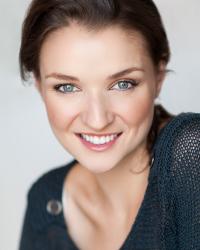How to swing well – Rachel Cole with Tanya Mitford
Welcome to Stage Door Shrink, a regular column aimed at helping performers chortle their way to a #win.
Today’s Stage Door Shrink session looks at how to swing well – in the performing sense, not keys-in-a-bowl sense…
Musical theatre casts are, generally, made up of leads, ensemble members and swings. If you’re not in the industry, a swing is someone who understudies or ‘covers’ multiple ensemble roles and/or leads. Often, swings spend their time at the theatre offstage, making sure they know every single movement, costume change, lyric, harmony and intention of the people they cover, stepping in at the last minute when someone is injured or sick (or has period pain or bwee: ‘bum-wee’, noun: what happens when you tour Asia and accidentally drink the water). It is without a doubt, the hardest job in a show and often, sadly, the least recognized.
Performers have strong opinions on Swinging. Some people (myself included) think it’s the best job going around. Others would, frankly, rather be unemployed than endure the stress of it. Most agree it is something important for a performer to do at least once, primarily to appreciate how difficult and important a job it is. A good swing is incredible, whereas, a swing who is not up to the task can be disastrous and dangerous.
When I was 23, I saw an audition notice for a cruise ship that wanted someone who ‘knew how to swing.’ Naturally, I sang some Paul Anka and showed them my moves. When the panel gently informed me that “a swing” was the position in the cast not a style of music, I was horrified at my song choice, bobby socks and ignorance, but amazed that such a role existed.
During my time at Wicked, I swung 8 ensemble tracks and 1 lead. I often found myself overwhelmed with the amount of information to learn, or looking for stuff to do in the greenroom. Some people watch 45 episodes of Will & Grace back to back, some people do degrees on the side or run a business. I write columns, sing scales and spend too much time on domain.com.au.
According to Tanya Mitford

Tanya Mitford is a Director & Choreographer who established her career swinging and Dance Captaining (DC) in major musicals. Now, she works as Resident Director (RD). You will recognize her face from both audition panels and the stage. With a mum in The Royal Ballet, she was able to see the bigger picture of a show – from ‘out the front’ – from an early age. A wonderfully diverse performer, she quickly forged a reputation as “that performer who could do everything”. With close to 60 professional credits to her name including: Cabaret (DC), Billy Elliot (CRD), Guys and Dolls (DC) and Fiddler on the Roof (DC). She has been involved in the casting of: Once, Grease and is currently Resident Director/ Choreographer on The Sound of Music. Needless to say, she knows exactly what is required of a great swing.
Do the hard yards early
Rehearsals are overwhelming for swings. Therefore learn all your music, lyrics and lines before you start. Once rehearsing, learn all the group choreography, and then focus on 1 track, as a base camp. Naturally, you will start to learn what is going on around you, thereby making other tracks easier to learn. Always carry a notebook, to mark any changes, entrances/exits/tech notes.
Talk to Stage Management/DC’s Early
See if you can film rehearsals or get a copy of an archival. Find out which tracks you cover first and all potential covering arrangements, to decide in which order to learn the tracks. Then become a self-sufficient learner for a time.
Cultivate in yourself useful traits
Learn not to be a stress head. It will feel like a train wreck for a while, but one day soon, everything will make sense. If you stress out on stage, you will make it dangerous for everyone else. Be flexible- learn to cope with last minute changes and make intelligent decisions on the spot. If you have an ego- get rid of it.
Appreciate the great parts of swinging
If you’re on a long run, doing 1 ensemble plot can get boring. A swing’s work is never done- and this is a wonderful thing, especially if you have an active mind. There are new challenges every day and split tracking is tricky and so rewarding! Your boundaries will be pushed, (but meeting those demands will pleasantly surprise you.) The pressure cooker will refine you.
Take care of your own mental health
Swings are often perfectionists who have high standards for themselves. You will ruminate on every tiny mistake you make, and beat yourself up over it. Be gentle with yourself. If it’s your first time on- remember, if you didn’t kill anyone- its all good. Second time, fix the mistakes you made. Third time, you’ll have it down. You have a swing family, talk to them. Some nights just suck: opening, closing or when you have 100 people in watching and you’re not onstage. It’s like not getting invited to your own birthday party. Be prepared for them, and spend the show making sure you have the best hair at the party instead.
Make your own set of notes: onstage and shadow
The very process of writing notes, will help you to learn your tracks. Don’t rely on the DC’s notes or plot sheets. Find out what works for your brain- plot sheets, diagrams, words, numbers etc. Remember there is a whole other show going on backstage. Entrances, exits, traffic, where quick changes happen and when you have to get out of the way for the mech. You can only learn this by shadowing each track from side stage.
Remember, you are not ‘less than’ you are ‘yes, and’
There is often a misconception in Australia, (compared to Broadway and The West End), that swings are ‘less than’- that they are not good enough to be in the ensemble. Nothing could be further from the truth. A swing is a ‘yes, and.’ In an audition, we can spot a good swing a mile away. Their CV and skillset are diverse-they are those who can do everything: sing that top B, do the dance solo on center, cover that lead, capable of a 5 minute make-up challenge, carry the scenery etc.… You are a rare and valuable breed.
Acknowledge the 2 speed workplace
You have to learn to cope with both manic busyness and thumb twiddling. At times you might not go on for a month. Some people take on part time study etc., but I think it’s better to remain focused on the show while you’re at work. After all, that Producer is paying you for your time and your mental energy while you’re in the building. While offstage for long periods, make sure you stay show fit, vocally fit and ready to go on anytime.
Be prepared to feel left out at times
Being locked away in a dressing room can be isolating. Funny things will happen on stage, and you missed the joke. Drinks are organized in the crossover and you weren’t around to hear the invite. That will happen more if you lock yourself in a dressing room glued to your laptop watching Parks & Rec. Don’t wait for an invite to be included, include yourself.
It’s not about you, it’s about show integrity
A swing is the show’s insurance policy. You enable 2000 patrons to see a show when half the cast is down. When you split track seamlessly, don’t expect praise and high fives from the whole cast. Be proud of yourself. Everyone else is too busy thinking about their own show to be thinking about congratulating you. It’s an incredibly hard job, and not everyone will appreciate you – so get your confidence from within and enjoy the ride.
Rachel Cole is a Research Psychologist masquerading understudy for Miss Honey and Mrs Wormwood in the Australian production of Matilda the Musical. She likes to think about what makes people tick. She also likes: Podcasts, politics, pepperoni pizza, property, puns, puppies and cheap things. If you know of a political podcast full of puns we can listen over a cheap pepperoni pizza while we walk a cheap dog looking at cheap property, we might just be fast friends.




